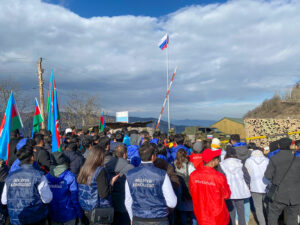By Jacob Kamaras

LA JOLLA, California — San Diego was thrust into the foreign policy spotlight last week when President Joe Biden as well as the prime ministers of the U.K. and Australia convened here to announce a submarine security pact. But another, often-overlooked region of the world is also on the White House’s radar of late.
Secretary of State Antony Blinken held calls with Armenian Prime Minister Nikol Pashinyan and Azerbaijani President Ilham Aliyev on March 20 and 21, respectively. The diplomatic effort came after violence flared up in Eurasia’s South Caucasus earlier this month, as five people were killed in a clash between Armenia and Azerbaijan in the Karabakh region of Azerbaijan.
Why exactly have Armenia-Azerbaijan tensions increased, why has the U.S. ramped up its diplomacy in the region, and why now?
These recent events should not be viewed in isolation. Rather, a Feb. 22 order on provisional measures requested by both countries to the International Court of Justice (ICJ) provide the broader context of what is currently at stake in these tensions. Armenia and Azerbaijan each brought cases against each other “concerning application of the International Convention on the Elimination of All Forms of Racial Discrimination (ICERD).”
The world court ordered that Azerbaijan “shall, pending the final decision in the case and in accordance with its obligations under the International Convention on the Elimination of All Forms of Racial Discrimination, take all measures at its disposal to ensure unimpeded movement of persons, vehicles and cargo along the Lachin Corridor in both directions.” The Lachin corridor is the road connecting Armenia with Karabakh, the territory that Azerbaijan liberated in its 2020 war with Armenia.
Following three decades of Armenian military occupation in the area, Azerbaijan has since November 2020 undertaken comprehensive efforts to rebuild Karabakh, which four U.N. Security Council resolutions affirm is Azerbaijani territory. Under the Russian-brokered statement that ended the 2020 war, Azerbaijan guaranteed the use of the Lachin corridor solely for humanitarian purposes and commissioned a new road for Armenian residents in less than two years.
Where do Californians come into the picture? Southern California is home to a number of Armenia’s most vocal advocates in Congress. This includes Rep. Adam Schiff, who in February hosted “Permanent Representative of the Nagorno Karabakh Republic to the United States” Robert Avetisyan as his guest at the State of the Union address. Avetisyan’s presumed title is a misnomer, as Schiff and likeminded Southern California lawmakers ignore that Karabakh is internationally recognized as part of Azerbaijan, rather than a “republic” of its own.
Schiff has claimed that Azerbaijan “laid siege to the region by blocking the Lachin corridor.” The reality on the ground, however, is far more nuanced.

In December 2022 — in response to the Armenia’s illegal movement of nationals of other countries into the territory of Azerbaijan, for the rotation of Armenia’s armed forces illegally deployed to Azerbaijani territory, transfer of military equipment and armament (including landmines), and trafficking of natural resources of Azerbaijan — environmental activists and others from Azerbaijan who became known as “eco-protesters” launched demonstrations along the Lachin road. Despite claims surrounding the “closure” of the road, it remains open to Armenians for humanitarian purposes.
Armenia was quick to claim victory after the ICJ’s Feb. 22 order, and mainstream media reports echoed that narrative. The typical headline stated, “World Court orders Azerbaijan to ensure free movement to Nagorno-Karabakh” (Reuters). Such reports, however, are devoid of context. In actuality, the world court rejected two of the three measures that Armenia raised in its case — the demands that “Azerbaijan shall cease its orchestration and support of the alleged ‘protests’ blocking uninterrupted free movement along the Lachin Corridor in both directions” and that “Azerbaijan shall immediately, fully restore and refrain from disrupting or impeding the provision of natural gas and other public utilities to Nagorno-Karabakh.”
Consequently, the court’s ruling demonstrates that multiple recent claims by Armenia — about the Azerbaijani government orchestrating the recent eco-protests, and around Azerbaijan disrupting the supply of natural gas and other public utilities to the area of temporary deployment of Russian peacekeepers in Karabakh — are unsubstantiated.
Even on the court’s order that Azerbaijan shall take all measures at its disposal to ensure unimpeded movement of persons, vehicles, and cargo along the Lachin corridor in both directions, the ICJ expressed its opinion on a provisional measure — and therefore, the order does not constitute a final decision.
Simultaneously, the court declined to satisfy Azerbaijan’s requested provisional measure of ordering Armenia to provide information about the location, quantity, type, and characteristics of landmines, booby traps, and any other explosive devices in Karabakh.
Armenia has used the Lachin road to transport landmines and plant them in the territory of Azerbaijan — posing threats to the post-war reconstruction work in Karabakh, to the civilian population working in the area and to the return of Azerbaijani internally displaced persons to peaceful life in their homes. Since the end of the war, 46 Azerbaijanis (including 35 civilians) have died in Karabakh and 230 more have been injured from explosions of Armenian-made landmines, according to Azerbaijan’s government.
In November 2020, when Armenia had several weeks to withdraw from Karabakh in accordance with the Russian-brokered ceasefire following their surrender in the war, they used the time to plant difficult-to-detect explosives that have complicated Azerbaijan’s redevelopment of the liberated territories.
The ICJ ruled that ICERD does not “plausibly impose any obligation on Armenia” to take the demining-related steps that Azerbaijan requested. Yet at the same time, the world court did not explicitly dispute the plausibility of Azerbaijan’s concerns regarding Armenia’s ongoing planting of landmines and other explosives in Azerbaijani territory, including the abuse of the Lachin road for that purpose. Rather, the court considered the matter exclusively within the framework of the case before it, namely the ICERD, and based on urgency contrary to the claims, this conclusion of the court is by no means prejudice to the obligation of Armenia not to plant landmines, booby traps, and other explosives in the territory of Azerbaijan or not to share information on the location, quantity, type, and characteristics of such devices. Nor has the court made any observation on the plausibility of the concerns of the Azerbaijani side related to Armenia’s ongoing planting of landmines and other explosives in the territory of Azerbaijan, including the abuse of the Lachin road for this malign purpose.
Additionally, Armenia admitted during the hearings at the world court that indeed, it has produced the landmines discovered in Azerbaijani territory following the Russian-brokered statement that ended the 2020 war.
Moving forward, when it comes to Armenian and Azerbaijani cases against each other at international tribunals, it is important to dig deeper and avoid taking the typical news headlines at face value.
*
Jacob Kamaras is the former editor-in-chief of the Jewish News Syndicate and the founder of Stellar Jay Communications, a PR firm representing Azerbaijan.